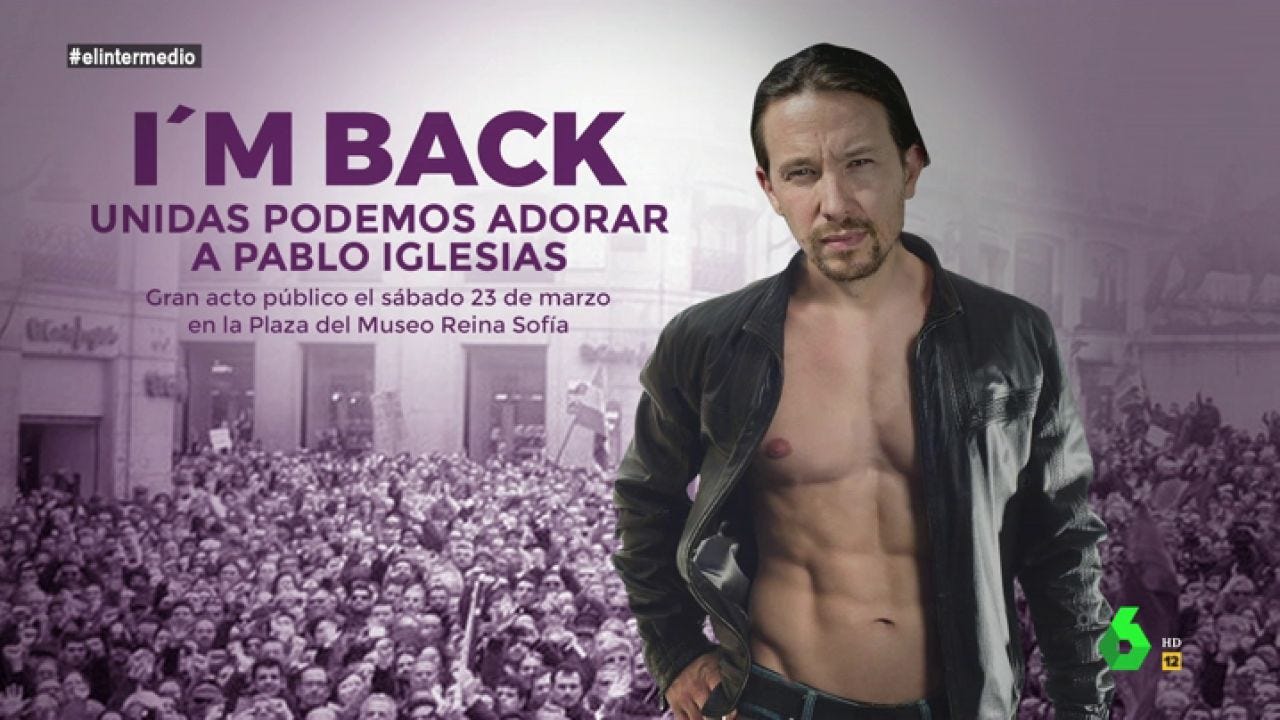Memetic Crystal Ball: a peek into the future of Pablo Iglesias
Narrative is made of tropes, storytelling devices that are recognizable within a specific culture. Thus, a trope is a type of meme; specifically a meme put in the service of a story. Archetypal characters, locations, and situations, such as the Big Bad Wolf , Arcadia, or the Mexican Standoff are all examples of tropes. By the tropes used, one can usually tell when a story is going to end well and when it isn’t, although surprises do happen. A tale is well told when its tropes flow gracefully; this leaves room for creativity and memetic mutation, making the tale interersting.
Narrative lies at the soul of politics, but political narratives (especially democratic ones) are different from literature in that they work best when they are predictable. People feel understandably safer when they think they know where they are going. Lack of meaning is death, so often societies will follow a disastrous course to the bitter end, just to enact the role they think History has given them. The moment a civilization loses confidence in its mission to continue existing, it is doomed: a narrative of decline will take over and people will instinctively fulfill it.
Being able to build and sell a narrative of future success, putting the audience under a memetic spell, is normally conducive to electoral victory. Conversely, if a story has a predictably bad ending –it has cursed memes– nobody is going to bet on it: no investors, no followers, no voters, no anything. For example: when somebody internalizes the role of the Tragic Hero, Noble Defender of Causes Past, that’s exactly what he becomes; everything he touches will be marked for destruction. Ask any 2000’s conservative culture warrior.
Memetic magic of this type is what makes martyrdom a successful propaganda tactic. A martyr embraces death, but a death which has been previously codified as a victory. Through memetic transmutation, the factual defeat of the martyr becomes a victory, since it is coherent with the overarching narrative of martyrdom. It is all a matter of framing: if the martyr recants before his death, the martyrdom narrative does not hold water, and the memetic spell fails. Psychotherapy works like this too: reframing traumatic events, turning them into the milestones of a memetic journey to triumph.
In memetic magic warfare, fake it till you make it is a basic operational procedure. People can smell future success in others. Like pheromones, the scent of the spell is imperceptible but immediately effective. The way an aspiring leader portrays himself is usually formulaic; there is a trope underneath, an archetypal pattern for the framing of his behavior. In liberal democracies, this is well known, and politicians usually act through carefully designed personas. They try to show themselves as the Old Wise Man (Sanders), the Idealistic Reformer (Obama), the Everyman (George W. Bush), the No-nonsense Outsider (Trump)… Different, more colorful characters populate other memetic environments, such as the Messianic Visionary (Hitler), the Fiery Revolutionary (Fidel Castro) or the Boisterous War-time Leader (Churchill).
Cue Pablo Iglesias (b. 1978), Secretary General of the Spanish Leftist party Podemos (“We can”), Vicepresident and Minister of Social Affairs in the current Government. Like many Progressives, Iglesias’ story begins in academia. He graduated with honors in Law and Political Science at Complutense University of Madrid, a campus notorious for its leftist pedigree. After getting his PhD, he studied the connections between cinema, psychoanalysis and political science at the European Graduate School in Switzerland, where luminaries such as Lyotard, Derrida and Baudrillard taught at the turn of the century.
Iglesias’ ideological horizons, though, are not to be found in the verbosity of French post-Modern philosophers, but on the slogans of Latin-Americanist, bolivarian revolutionaries of the chavist variety. A symbol of the post-2008, Occupy Wall Street political landscape, he quickly became the scourge of the Spanish bipartisan (at the time) establishment. He started showing up in different Leftist media, even hosting his own show, Fort Apache, broadcast in the Iranian Spanish language channel Hispan TV. With his signature ponytail and somewhat unkempt appearance, he was an icon of the “new politics” that were supposed to lead the country to a new era of real democracy and social justice. Iglesias’ concept of the political seemed more Schmittian than Marxist, and the friend-enemy division of society between gente (people) and casta (caste) was a key element of his early discourse. Abrasive and self-righteous, he led Podemos’s pioneering of the escrache and the language of progressive puritanism in the Spanish mainstream.
Ruthlessly taking control of Podemos since its inception, Iglesias alienated most of its founding members, many of whom were former colleagues and friends from campus. People like Carolina Bescansa, Luis Alegre, Juan Carlos Monedero or Íñigo Errejón have all fallen from the party’s ranks, either purged, disillusioned or at odds with its leader. It is said that, since his early years as a university activist, Iglesias was famous for oozing ambition and having a grandiose sense of his own destiny. His media presence made him bigger than the Party from the start, so his leadership was always out of discussion.
As is to be expected from an aspiring Caudillo, and despite all his previous claims to blue-collarness, Iglesias’ political career has recently allowed him to enter the bourgeoisie. To the dismay of his working-class followers, he’s bought a mansion in Galapagar, a luxurious suburb of Madrid. The property is complete with a swimming pool and a security detachment of the Civil Guard (Spanish gendarmerie), now tasked with suppressing the escraches he used to love. He shares his roof with Irene Montero, a party loyal 9 years his junior. Montero is not the first woman in Podemos to succumb to Iglesias’ charm, but she’s the mother of his three children and now a fellow member of government (funnily enough, she is “Minister of Equality”, spearheading the government’s SJW offensive).
When a lukewarm conservative-technocratic government led by Mariano Rajoy ended up succumbing to a non-confidence vote in 2018, Iglesias leveraged his position at the edge of the Spanish Overton Window to secure a place into an even more fragile government led by Socialist Pedro Sánchez, Secretary General of the PSOE (acronym for the Spanish Socialist Workers’ Party). The new government, which has been in power since then, only attained majority after enlisting not only Podemos, but several Separatist parties from both Catalonia and the Basque Country. This uneasy coalition has proven very difficult to handle, a fact which may or may not explain part of Spain’s terrible management of the pandemic. A deep skeptic of the concept of Spain as a national entity, the climate of constant identity crisis is a most natural habitat for Iglesias.
His presence in the Government has allowed Iglesias to access State secrets and the Intelligence Community. Certainly, the role of spymaster fits his views on power and politics much more than his official title of Minister of Social Affairs. Iglesias talks a lot about the wealth redistribution, but seems to enjoy more conspiracies and spycraft. He is not one to be troubled by the “contradictions of power” that more idealistic revolutionaries seem to lose their sleep over. He is referred to as the Alpha male of Podemos; a canine metaphor he appears to cultivate. An outspoken fan of Game of Thrones, Iglesias revels in the sordid cynicism and shamelessness modern audiences mistake for realism and honesty.
Unrelenting persecution from right-wing opposition parties has exposed all kinds of mischief, real or alleged, on Podemos’ part: supposed dirty dealings with South American narco-regimes, possible ties with the Iranian State, financial irregularities... To the accusations, Iglesias responds the Right is trying to stage a coup against the government. Lacking popular support, "the Fascists" do it covertly with the help of the Deep State.
College professor, revolutionary, TV show host, bourgeois power broker, conspirator. What’s the next step in Iglesias’ character development? His opponents accuse him of being a totalitarian; a wannabe Mao or Stalin. But if this were one of the TV series he so loves, something doesn’t fit with the characterization. Pablo Iglesias is no Great Steerman, no Man of Steel. He seeks a place in History for himself, but he is no Dear Leader material. Is he, then, a Visionary Martyr? He lacks the poetic fanatism and artistic vision for it: he is neither a Hitler, nor a Mishima, nor Osama Bin Laden. His apparent lack of interest in ruling and in managing the grey gears of a bureaucratic state also situate him even farther from being a Richelieu nor a Lee Kwan Yew.
We have to look for a different archetype when trying to guess who Pablo Iglesias is becoming. It has to be a figure capable of historical significance, but unconcerned with the mundane affairs of ruling, and more invested in cultivating a dedicated fan base than in winning over his country's love. When Iglesias speaks, he does to a loyal audience, and does not try to appeal to those who instinctively hate him. He is a professional agitator, and has grown restless as soon as he has reached some measure of power.
No, Pablo Iglesias is a different kind of beast: the Intellectual Ex-Stateman, best exemplified by Trotsky. A brainy, exiled figure writing diatribes about why the revolution failed, to be read by the excited eyes of his college-aged fans. This is the subconscious impulse behind his efforts to lure the opposition into a coup: guaranteeing his defenestration, so that he can write about it. He has always been intent on securing a place in History books, and this would be a very fitting way for him to do it. The character development device of choice for the Screenwriters of Reality.
Of course, this is just a Wild Mass Guess. Reality is much more chaotic, and only seldomly follows the logic of a script, making this essay fall into the territory of wild speculation (the kind we love so much here at The Outpost). But still, you've got to be careful with memes. A man can fall prisoner to his own legend. The comparison of with mind viruses is not casual. We will never know if Frogtwitter and 4chan did indeed “meme Trump into the White House”, back in 2016. Let us see the plot follow its natural course, and pay heed to the lesson hidden in this fable. Mind worms are everywhere, and their blind eyes have seen the Future.





